Chapter One - Born into War
Chapter One of "Open to Possibilities: The Life of a Young English Nurse"
Air raid sirens wailed their rising and falling tones into the night air. In the darkness Florence helped her mother into the air raid shelter in the back garden of No. 2 Crofton Crescent. Florence would have preferred to stay in the comfort of the house, even in the dark, but her father James worked as an Air Raid Precautions (ARP) Warden. Although he was too old to be conscripted, he took his job as an ARP Warden very seriously. He had been out all evening checking that the homes in the neighbourhood were maintaining a complete blackout. Even a crack of light from a window could attract the attention of the German bombers. Now that the sirens had sounded, Florence knew he would make sure everyone had their gas masks with them as he hurried them into the nearest bomb shelter. Everyone needed to be sheltered before the now familiar rumble of German planes shook the city with their bombs. It wouldn’t do for her father to find his own family ignoring the safety procedures.
Florence’s mother, Frances, had been ill with cancer for some time, and lately it had weakened her. She made her way with some difficulty into the back yard, leaning at times on her daughter. Florence was pregnant with her first child, and although she was not suffering in the same way as her mother, she was not keen to spend another night in the shelter. Like many others who had a back garden, Florence’s family had an Anderson air raid shelter installed. It was made of corrugated steel and was set into a pit that was about four feet deep. Moisture had seeped in over the winter, making it particularly cold, damp and smelly. Once inside, she wrapped a blanket around her mother’s shoulders and her own, and they settled together on the small bench.
It was May 1941, and the bombings had been unrelenting for days. Liverpool was a city in tatters. At night, fires from the docks on the River Mersey lit up the night skies. Liverpool had one of the most important ports in Britain at the time, and the city and the areas surrounding the port were a priority target for German bombers during the second world war. By the time the final “all clear” siren sounded at the end of what would become known as the “Liverpool Blitz” in May 1941, over 4000 residents had been killed by the German air raids, and many more had lost their homes. Florence wondered what sort of world awaited the baby she was carrying.
As soon as she heard the single, continuous note of the “all clear” siren, Florence shoved the heavy door of the shelter open. She felt the now familiar wave of relief as she peered out into the darkness and saw the shape of the family home. It was still there. She assisted her mother into the house and back to bed, then ventured out into the street to see if there had been any damage nearby. The neighbourbood was some three miles from the docks; it was outside of the targeted zone. She didn’t expect there to be damage, but it was always a possibility. Many of her neighbours were making their way home from the bigger air raid shelters. Anyone who didn’t have a shelter in their own garden went to the larger shelters when the sirens sounded. Florence was relieved to see the neighbourhood around her family’s home on Crofton Crescent was unharmed. People in the street seemed in good spirits. Florence, her parents, and their neighbours were safe.
Was that true for the rest of her family? That was the thing about wartime, by the time a family received news from their loved one, weeks may have passed, and anything could have happened in that time. It wasn’t possible to know with certainty how, or where anyone was at any time. Her own immediate family was spread across England, but only her youngest brother Charlie had been sent abroad.
Charlie was a full nine years her junior, and he was a cheerful, motorcycle-crazed lad. It was only fitting that he had been sent to Belgium to serve as a dispatch rider, a motorcycle courier moving messages from military headquarters to the frontline. He was even able to take his own motorcycle to use there. There was a shortage of military vehicles, and civilian vehicles were often used in the war effort. Florence knew Charlie was not living in barracks overseas. Instead, he was billeted in a Belgian home. The Regelle family was hosting him, and in a lovely act of kindness, Madame Regelle sent occasional letters to Florence and her parents. In them, she expressed the family’s gratitude for having Charlie stay with them, and how fond they were of him.
It was always a relief to receive such a letter. Many other families whose sons had been sent overseas had not received heartwarming letters. They had received a telegram stating their son had died in service or was missing in action.
Florence was a new bride. Her husband, Harold, was based at Aldershot, a military training base southwest of London. They met through Florence’s younger sister, Mona. Harold was a slight man, with thinning auburn hair, and a quiet, but cheerful demeanour. They were not yet married when he was conscripted in the autumn of 1940, as the German raids on Liverpool began in earnest. Harold had been sent to Aldershot for training as a radio operator with the Royal Engineers arm of the British Army as many new conscripts were. When he returned home to Liverpool over Christmas later that year, he and Florence had married in a small ceremony at St. John’s Anglican Church in Knotty Ash, just days after another period of sustained air raids. Florence and Harold posed for two photos on the day of their wedding. When the photographer returned their photos, there was only one and it was a bit bizarre. The photographer had accidentally exposed both images in one frame, one taken horizontally, and another over top in a landscape orientation.
After the wedding, Harold moved in with Florence, joining her parents’ household for the brief time he would be in Liverpool, before returning to his training. His training had ended, and he was now based at Aldershot. He expected he would be deployed overseas, but that had not happened yet. As he was still in the country, whenever he had a few days of leave he could come home for a short visit. Florence and Harold were expecting their first child in October of 1941.
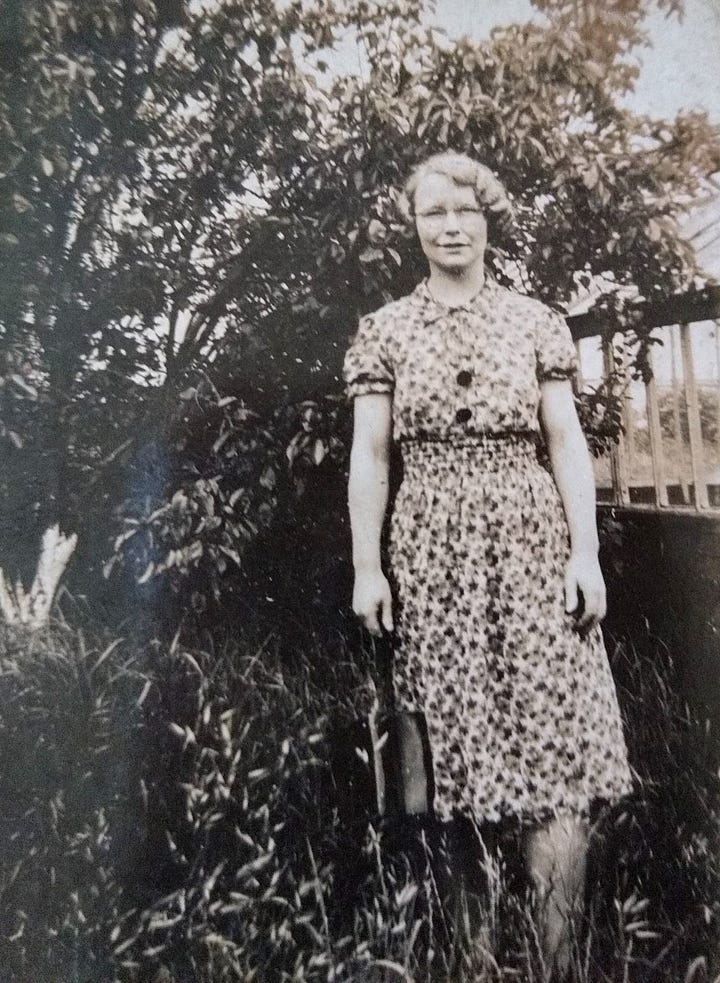
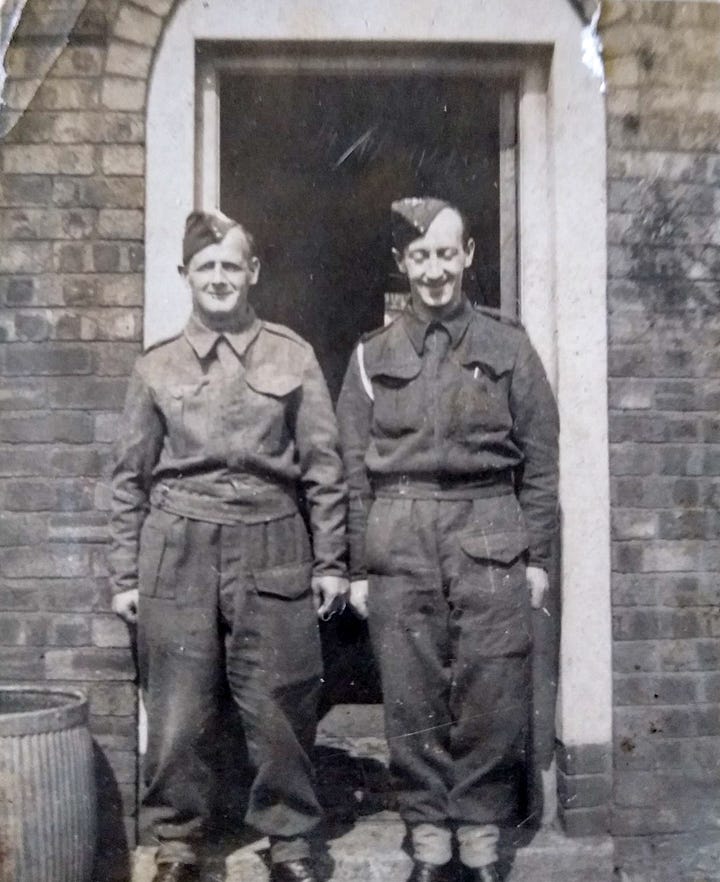
Florence had two more siblings, her brother Ronnie, and her younger sister, Mona. As with most other families in England during the war, everyone who was of age and was fit had a role to play in the war efforts, even if they weren’t conscripted by the military.
Ronnie was a good example of a citizen who was doing non-military service - he was an electrician at a coal mine. As coal was used in the factories that were making weapons and other items to support the war efforts, Ronnie’s job was designated as essential, and he was exempted from conscription. Ronnie worked away in Tyldesley, near Manchester, during the week and only travelled back to Liverpool on weekends to see his wife Kathleen and their adopted son, John.
Even Florence’s younger sister Mona had a wartime job. She had applied to the Women’s Royal Air Force, and was quickly posted to a military base in England as a server in an Officers’ Mess.
As the oldest daughter, Florence stayed home to be a caregiver as her mother’s cancer progressed. She looked after the family home, queued for rations, and other basic daily tasks to sustain her parents and herself. Each morning, she would take the family’s ration book and join the queues at the shops. Sometimes the queues were long, and it wasn’t always certain what items were available at the end of the queue. Still, getting something was better than nothing. Meat was scarce, and when vegetables were available people snatched them up regardless of the condition of them. Fortunately, bread was almost always available. Pregnant women were permitted to move to the front of the queue, but few did. They didn’t want to face the scorn of everyone else who was still waiting. Florence was a stoic woman who rarely made a fuss about anything. She waited her turn along with everyone else.
In October 1941, Florence gave birth to a healthy baby girl in Broadgreen General Hospital, the nearest hospital to their home. Harold had been set on naming the baby “Joe” if it was a boy, and “Jo” if it was a girl. Florence had other thoughts. Harold was in Aldershot at the time of the birth, so Florence sent him a telegram. It read:
“We have a baby daughter. I have named her Patricia.”
Patricia was a cute, nearly bald baby. The little hair she had was so blonde it looked like white little wisps against her pink scalp. Her relatives nicknamed her “Whiskers” until her hair grew in more fully. Florence settled into the routines of being a new mother, while continuing to care for her own mother. Little Patricia was only six months old when Florence’s mother died. Frances was only 56 years old at the time of her death, and while the family expected it would happen, it was a difficult time.
Within weeks of Frances’ death, Harold received orders to deploy overseas. Before Harold deployed, his father-in-law signed the rental agreement for the house at 2 Crofton Crescent over to him. James continued to live in the house with the family, but it was time for the next generation to take responsibility for the home.
After Harold deployed to Burma to serve as a radio operator in the war, a friend of Mona’s, named Joan, moved into the house with Florence, little Trish, and James. Joan had been widowed by the war, and had a young son, about Trish’s age. She did not have the means to maintain a home on her own, as she was caring for her young son. As Florence was no longer caring for an ill parent, and Joan could look after Trish during the day, Florence began working outside the home. She and her sister-in-law Kathleen worked as “land girls” on a small dairy farm in nearby Knotty Ash. So many men had been conscripted to the war, women were encouraged to volunteer, and some were conscripted, to work in a variety of jobs formerly filled by men, including jobs in agricultural to maintain critical food production. The farmer in Knotty Ash was an older man, exempted from conscription, possibly because of his age, or perhaps because he was a farmer. All his farm hands and seasonal labourers had been conscripted and he needed additional help on the farm. Florence and Kathleen cared for the cows, tilled the fields and took care of the vegetable crops. The job was physically demanding, but it was outdoors, and it was useful work.
In return for their efforts, the women each received a small wage, and fresh vegetables. The vegetables that Florence and Kathleen received for their work in Knotty Ash were much fresher and in better condition than anything that could be found in the shops. Florence was proud to be able to provide healthy food for little Trish as she grew, and for the rest of the household.
Trish was a bright and curious child and thrived in the care and attention from not only Florence, but Aunty Kathleen and Joan and her Granddad James. Her Aunty Mona showered her with gifts whenever she was on leave.
Trish was quick to learn to walk and talk, but despite her precociousness, as she got older she developed some nervous habits. Florence often chided her for chewing her nails, sucking her thumb, or twisting her hair to comfort herself. Not long after she learned to talk, she developed a pronounced stutter in her speech. Florence found a woman who could offer Trish elocution training, similar to speech therapy. The training worked, and the stutter disappeared after a few months of sessions. Florence, an avid reader herself, ensured Trish learned to read before she began nursery school. Given Trish’s nervous habits, Florence wanted her to have the easiest transition into her school years as was possible.
Before Trish started school there was a change in the household; Joan met a soldier from the United States who had been based in Liverpool, and she married him. When her new husband returned to the States, Joan and her young son went with him. That left only Florence, Trish, and James in the house at No. 2 Crofton Crescent.
At the end of summer in 1945, Florence walked Trish to nursery school for her first day of school. Trish seemed keen to go to school, and they had a pleasant walk. Florence took her through the front gates of the nursery and into the main entrance, before leaving Trish with the teacher and returning home. Florence returned to No. 2 Crofton Crescent and opened the front gate. There was Trish, sitting on the front step. She had beaten her mother home. Trish had gone in the front door of the school, then as soon as the teacher turned her attention elsewhere, Trish bolted back out the next door she could find. She ran home as quickly as her little legs would carry her. She was all for going to school, excited even, but it hadn’t occurred to her she would be left there alone without her mother. She was having none of it. The same thing occurred more than once over the subsequent days, until Florence was able to convince Trish to stay at school with the threat of ‘a good hiding’ if she came back home again before the end of the school day!
The official end of the war was September 2, 1945, and after the initial celebrations marking the end of the war, little changed in day to day life. Trish was well into her first year of nursery school by the time Harold returned home. He had contracted malaria during his service in Burma, and although he had been discharged from duty when the war ended, he spent time in hospital before being able to return home. Trish had been just six months old when he left, and when he returned she did not remember him. The life Trish had known to that point was turned on its head - there was a new person in charge of the house, with new rules and a much more serious demeanour than her mother. Although Harold had been released from hospital, he still had symptoms from his illness. He often had migraine headaches and required complete silence in the house until the headache subsided. He would occasionally have flare-ups of malaria, and a doctor would come to the house to treat him. In those times, the house needed to be quiet for much longer periods of time. It was difficult for Trish to adjust to the changes. There was a strange man in the house. A man who didn’t know how to do basic things, according to a four-year-old mind. When Harold took Trish to the shop to buy some sweets, he didn’t even know he needed a coupon to exchange for sweets, and they had to leave empty-handed. Trish was appalled. Despite her indignation, in time new routines formed and life carried on, in part because of Florence’s steady presence and manner in the home, but there were more changes to come.
If you are enjoying reading Trish’s story, please consider supporting my work by buying me a coffee.
Coffee makes the world go round, and the words flow, as they say!
Author’s note:
We often see our parents through the lens of their roles in our lives— caregivers, disciplinarians, cheerleaders. Perhaps they are our role models or mentors, but who were they before they became these things to us?"
To better understand who my parents were before they were, well, my parents, I set about interviewing them about their lives before marriage and kids. I started with my mom.
Trish Lewis was 18 years old and desperate to escape a mind-numbing administrative job at a factory in Liverpool in the 1950’s. She made the impulsive decision to join a friend to interview for nurse’s aide training at Alder Hey Children’s Hospital. That decision changed the trajectory of her life and launched her into an interesting and rewarding career as a nurse.
Trish is my mom, and this is her story, as told to me in a series of interviews in 2024. The story is pieced together from Mom’s memory, photos, and documents. As we all know, memory is fallible. In the telling of this story, some names have been changed, either because they could not be recalled, or to protect the privacy of the person.





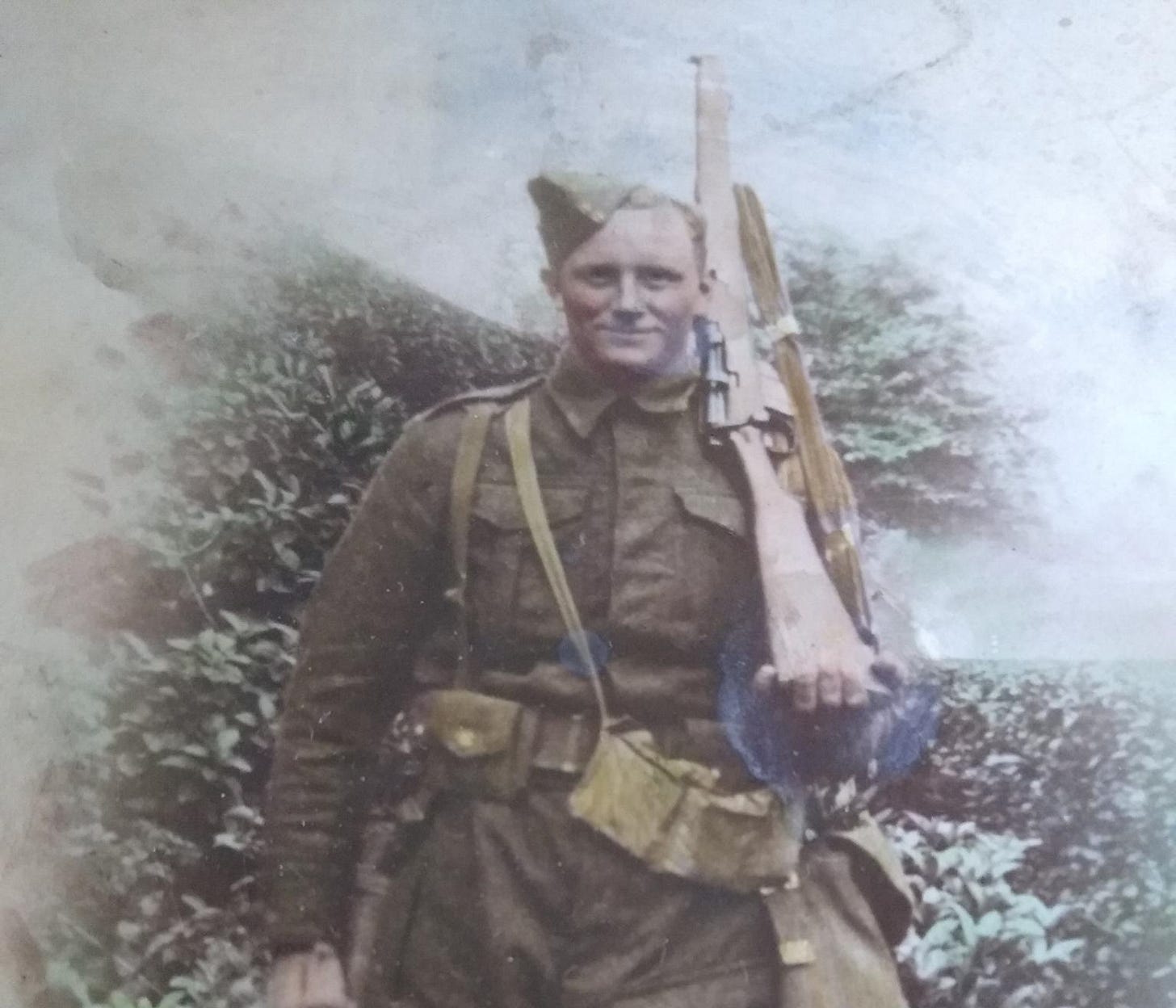
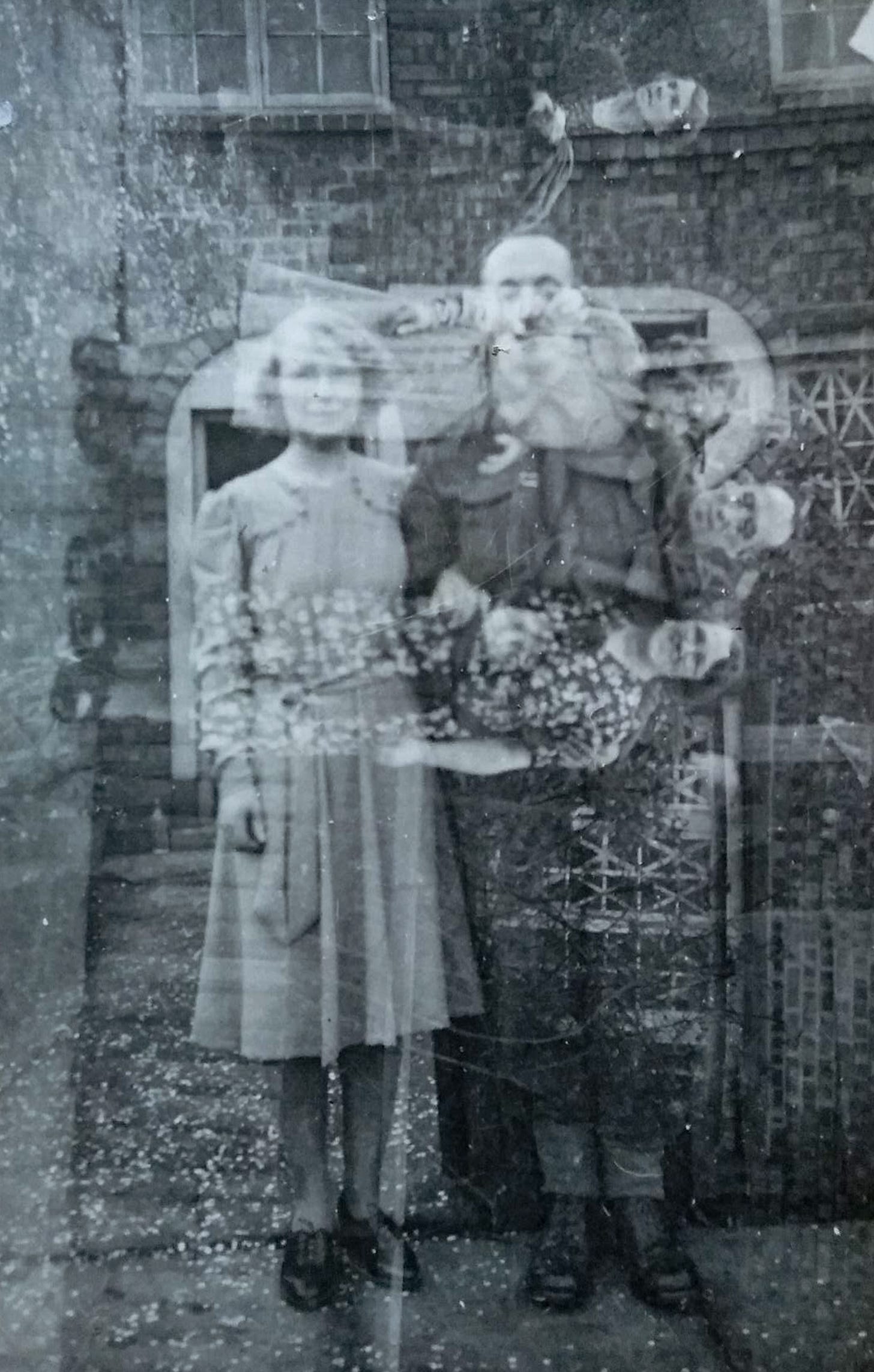


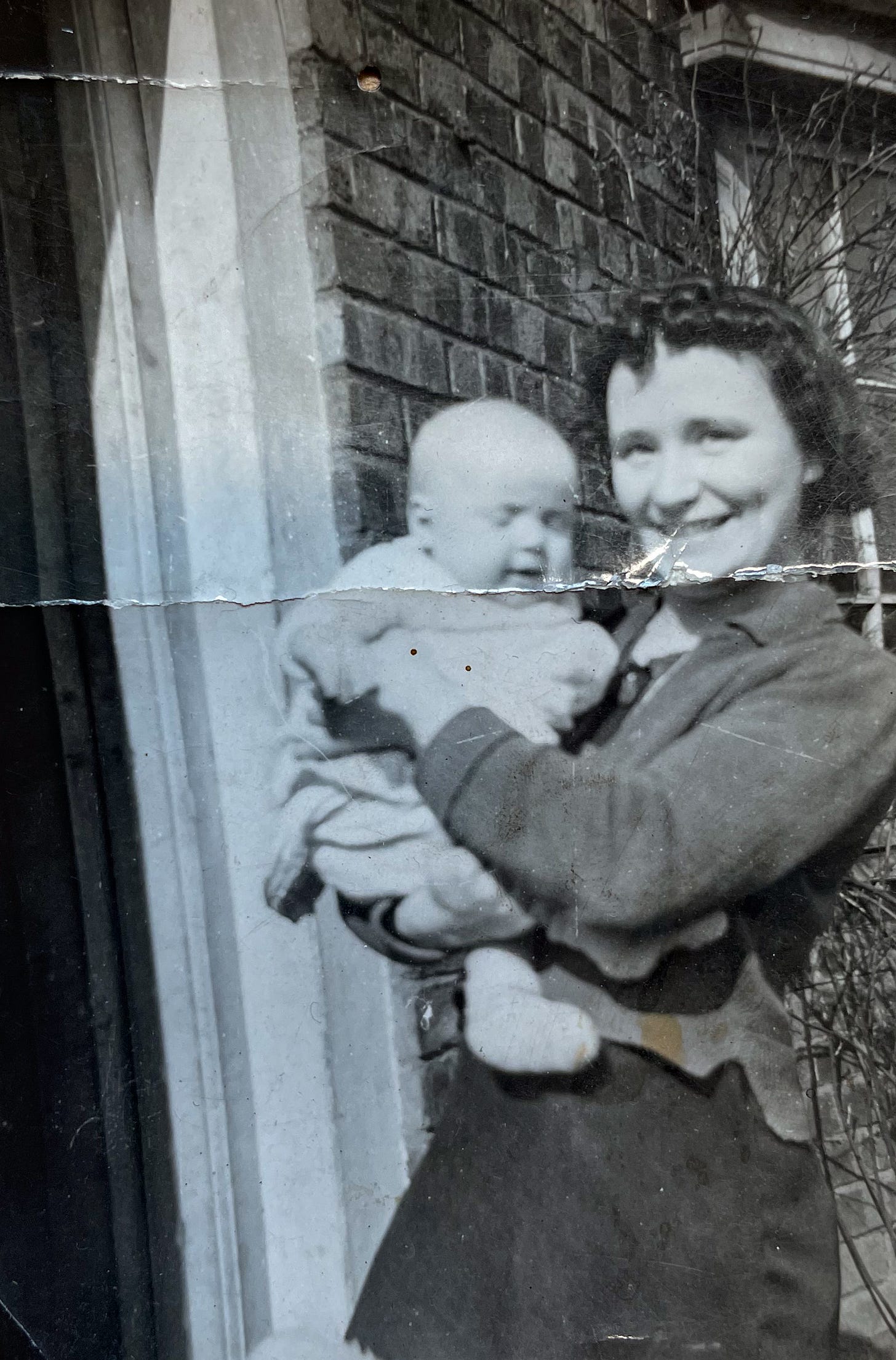

This is a story well told and compelling!! I’m looking forward to reading the rest! Here’s to chance encounters on the London Writers Salon! :). This makes me wish I could do such a project for my mom - sadly she has dementia and her memory is extremely bad. She and my late father didn’t like talking about their past before they got married.
But once in California they did create a story worthy life which I do hope to tell someday soon - as they built a sailing yacht and took my sister and I around the world on it!
And also nice that you’re living abroad too! (I’m in the Netherlands).
Very compelling - I look forward to reading more.